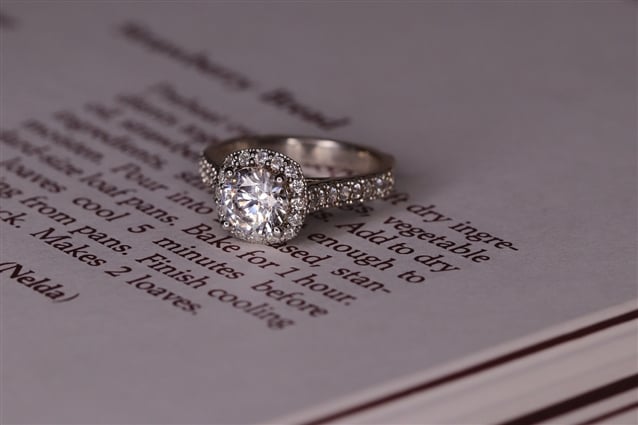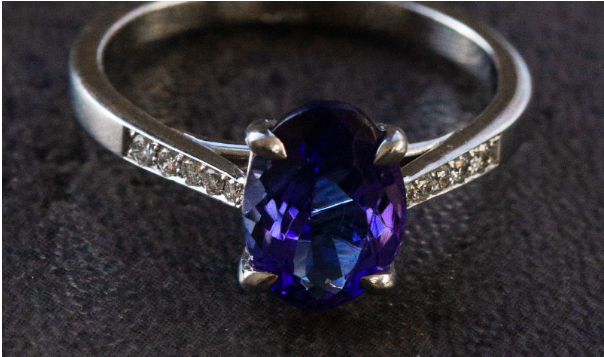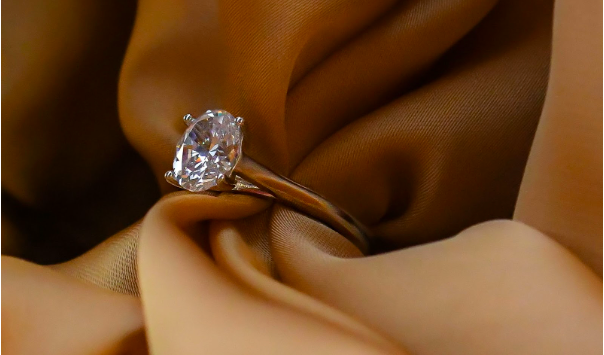Moissanite Vs Diamond: What's the Difference?
Diamond alternatives, like moissanite, offer jewellery buyers an opportunity to buy an ethical, cost-effective piece. But are they as good as natural diamonds? Are they as sparkly or valuable? Diamond Heaven’s article explores the differences between moissanite and diamonds.
What is a Moissanite?
Moissanite is a gemstone made from a rare, naturally occurring mineral called silicon carbide. French scientist Henri Moissan first discovered it in 1893 at the site of a meteorite strike in Arizona. While natural moissanite remains rare, most moissanite stones used for engagement rings are lab-grown.
Is Moissanite a Diamond?
No, a moissanite is not considered a diamond. Moissanite and diamonds are dissimilar in their chemical structure and how they are created. Diamonds can be mined under the Earth’s mantle or grown in a laboratory while moissanite is found in meteorites. Today’s moissanites are mainly made in laboratories to deal with the market demand. The stones are also aesthetically different in many ways.
What are the Differences Between Moissanite and Diamonds?
Diamonds and moissanite have many differences including their chemical composition, strength and hardness. However, both stones differ in their clarity, colour, brilliance and value.
Brilliance
Brilliance describes the reflection of light from a gemstone that creates sparkle. Moissanite sparkles with arguably less quality than diamonds. A diamond disperses more white light, giving clearer and more vibrant sparkle and shine. The disparity in brilliance separates diamonds from other gemstones when displaying light from the stone. However, moissanite can still sparkle very well in lots of colours.
Clarity
Clarity refers to the blemishes and flaws within gemstones, both internally and externally. Finding a flawless moissanite is easier than selecting the same level of clarity in a mined diamond as lab-grown moissanite has become more popular since the 1990s and this can now be manufactured in heavy quantities compared with rare naturally mined diamonds.
Colour
Compared to diamonds, moissanite is not a coloured stone. Moissanite stones are graded with the same colour scale as diamonds but on a less specific scale. You will usually find fewer options such as graded between D-F or G-I or J-K, meaning your moissanite stone will be within this range of colours. As moissanite is manufactured, you will see this less strict grading process used more often compared to the GIA’s four Cs where a diamond can only be given one grade on the diamond scale of D to Z.
Hardness
The diamond is the world’s hardest naturally-occurring gemstone as they have a perfect score of 10 on the Mohs hardness scale. Moissanite has a slightly lower score than diamond, with 9.25, but is rated higher than other gemstones used for jewellery which is why we see so much of it on the market today.
Price
Moissanite jewellery is cheaper than mined diamonds coming in at a fraction of the cost, allowing you to buy a larger stone for your budget. Like all lab-grown gemstones, moissanite will depreciate over time and hold less value as the supply continues to grow. As natural diamonds are rare, these stones will increase in value over time, making them a valuable family heirloom which can be passed down to generations.
Why Buy Moissanite Jewellery?
If you want an affordable mined diamond alternative, many customers now have replaced the thought of moissanite jewellery with a new alternative. Since the relaunch of lab-grown diamonds on the market, we have seen a decline in moissanite in fine jewellery pieces. Customers are now being educated on the differences between diamond and moissanite and have found that lab-grown diamonds are at a similar price but with more sparkle and a harder more durable stone. Here are the reasons why you might now be thinking of purchasing a lab-grown diamond instead of a moissanite option.
- Lab-grown diamonds are also an ethical and environmentally friendly alternative to mined diamonds.
- It allows you to get a larger diamond at an affordable price.
- Moissanite is not as hard-wearing as lab-grown diamonds.
- Diamonds are the most durable and hardest-wearing stones you can buy for jewellery.
Do you need help finding an engagement ring within your budget? Lab-created diamonds allow you to purchase a diamond engagement ring 50-60% lower than the price of a natural diamond. A lab-grown diamond is an excellent choice, offering you a more affordable diamond alternative to a moissanite engagement ring. As they are grown in a lab, they also offer an ethical option, giving you an environmentally friendly diamond you can love and cherish. Discover more about how lab-grown diamonds are created in our blog.
View our collection of diamond jewellery online or design your lab-grown engagement ring with our ring builder. Take the first step to pop the question by booking an appointment at your local Diamond Heaven showroom today.










 HPHT & CVD Diamond growth processes explained
HPHT & CVD Diamond growth processes explained Why Buy Tanzanite Diamond Jewellery?
Why Buy Tanzanite Diamond Jewellery? Why Buy a Silver Engagement Ring?
Why Buy a Silver Engagement Ring? A Guide to Vanessa Hudgens Engagement Ring
A Guide to Vanessa Hudgens Engagement Ring